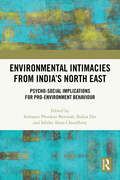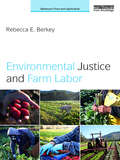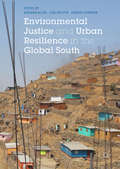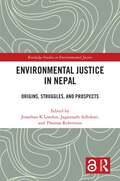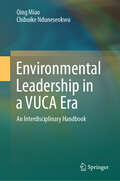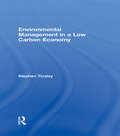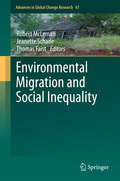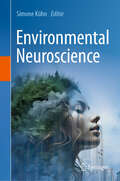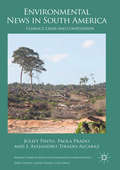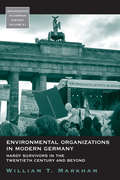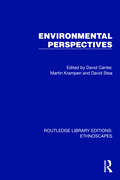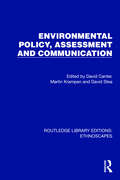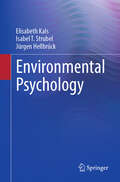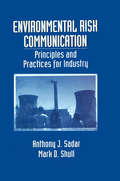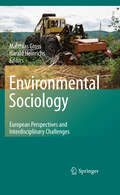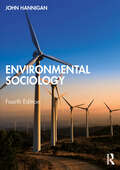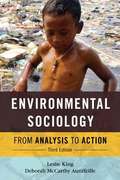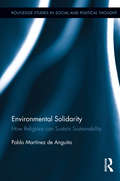- Table View
- List View
Environmental Intimacies from India’s North East: Psycho-Social Implications for Pro-Environment Behaviour
by Indranee Phookan Borooah Sabiha Alam Choudhury Bidita DasThis book explores the intimate relationship of the people of North East India with the environment as evinced from their traditional beliefs, cultural practices, and livelihood. It offers insights into the challenges and adaptability of communities through actions ensuring conservation of the environment yet sustaining their livelihood.The book encompasses movement toward responsible actions and the engagement of communities in pro-environmental behavior. It showcases the various practices, knowledge, and debates on the environment-behavior relationship of the people of North East India. It brings into focus some of the daunting environmental issues and the endeavors for sustenance that is true to a region which is rich in ecological diversity and touches the spirit and psyche of its people.This volume will be of interest to scholars and researchers of psychology, anthropology, sociology, environmental sciences, development studies, law and governance, environmental administration, and South Asia studies.
Environmental Justice and Farm Labor (Earthscan Food and Agriculture)
by Rebecca E. BerkeyUtilizing a model derived from literature on environmental justice overlaid with multiple scales of agriculture, Environmental Justice and Farm Labor provides key insights about laborers in agriculture in the United States. It addresses three main topics: (1) justice-related issues facing farmers and laborers on farms; (2) how history and policy have impacted them; and (3) the opportunities and leverage points for change in improving justice outcomes. It explores who labors in US agriculture and the justice-related issues facing these workers, including occupational injury and illness, lack of access to healthcare, substandard housing, hunger, low wages, issues pertaining to immigration, and the inability to organize. In addition, it assesses the impacts of labor safety, immigration and international policy, and in particular the effects of organic and fair trade certification. Two detailed case studies, one based on conventional agriculture in Florida and the other on organic agriculture in the Northeast, highlight the interrelated but unique challenges facing those who labor in the different sectors of this complex agricultural system. Finally, it touches on justice claims and the role of grassroots activism in improving justice outcomes by highlighting organizations operating at multiple scales to contribute to the livelihood of farmers and laborers in the different areas of agriculture.
Environmental Justice and Urban Resilience in the Global South
by Adriana Allen Liza Griffin Cassidy JohnsonThis edited volume provides a fresh perspective on the important yet often neglected relationship between environmental justice and urban resilience. Many scholars have argued that resilient cities are more just cities. But what if the process of increasing the resilience of the city as a whole happens at the expense of the rights of certain groups? If urban resilience focuses on the degree to which cities are able to reorganise in creative ways and adapt to shocks, do pervasive inequalities in access to environmental services have an effect on this ability? This book brings together an interdisciplinary and intergeneration group of scholars to examine the contradictions and tensions that develop as they play out in cities of the Global South through a series of empirically grounded case studies spanning cities of Asia, Latin America, Africa and Eastern Europe.
Environmental Justice as Decolonization: Political Contention, Innovation and Resistance Over Indigenous Fishing Rights in Australia, New Zealand, and the United States
by Julia Miller CantzlerThis book corrects the tendency in scholarly work to leave Indigenous peoples on the margins of discussions of environmental inequality by situating them as central activists in struggles to achieve environmental justice. Drawing from archival and interview data, it examines and compares the historical and contemporary processes through which Indigenous fishing rights have been negotiated in the United States, Australia and New Zealand, where three unique patterns have emerged and persist. It thus reveals the agential dynamics and the structural constraints that have resulted in varying degrees of success for Indigenous communities who are struggling to define the terms of their rights to access traditionally harvested fisheries, while also gaining economic stability through commercial fishing enterprises. Presenting rich narratives of conquest and resistance, domination and resilience, and marginalization and revitalization, the author uncovers the fundamentally cultural, political and ecological dynamics of colonization and explores the key mechanisms through which Indigenous assertions of rights to natural resources can systematically transform enduring political and cultural vestiges of colonization. A study of environmental justice as a fundamental ingredient in broader processes of decolonization, Environmental Justice as Decolonization will appeal to scholars of sociology, anthropology, environmental studies, law and Indigenous studies.
Environmental Justice as Social Work Practice
by Christina L. EricksonThis book places the natural environment as central to practice. Utilizing the Phases of Practice and micro to macro levels of practice, the book integrates neatly into a college semester course. Chapters cover important components of social work such as theory, ethics, conceptual foundations as well as distinct chapters on micro, mezzo, and macro practice. Each chapter expands the discipline's commitment to and applied efforts in the environmental movement while recognizing the unique contributions social work has to offer to ameliorate environmental inequities. Chapters include real-world stories from environmental social work practitioners, case studies, and boxed sections highlighting organizations and people who bridge the human and natural justice divide. Each chapter concludes with learning activities and critical thinking questions providing learning activities that map easily to a course syllabus. A matrix identifying the placement of educational competencies from the Council on Social Work Education is included. The textbook provides a framework for social work educators to bravely and competently teach environmental social work as a stand-alone college course or to incorporate into a traditional practice course.
Environmental Justice in Nepal: Origins, Struggles, and Prospects (Routledge Studies in Environmental Justice)
by Thomas Robertson Jagannath Adhikari Jonathan K LondonThis edited volume provides a holistic compilation of the diverse range of emerging scholarship in critical environmental justice studies in Nepal.This book brings together environmental justice scholarship set within a robust conceptual framework, focusing on a diversity of case studies from Nepal. Its locale-specific contextualization provides a unique analysis of the natural resource-based livelihoods common in the region, together with the health and well-being impacts of urban and industrial developments in its rapidly changing political, economic, social, and ecological environment. Centering contributions from Nepalese scholars and practitioners, this volume spans a wide range of topics, including the origins of environmental justice in Nepal, land and agriculture, conservation, infrastructure and development, Indigenous peoples, climate justice, and health equity. It reflects on the rise and development of social movements and public policy, discusses the further evolution of environmental justice, and highlights how the work of scholars, activists, and practitioners in the Nepalese context can enrich global conversations about social and environmental issues.This book will appeal to scholars, researchers, students, and activists in environmental justice, sustainable development, South Asian, and Himalayan studies.The Open Access version of this book, available at http://www.taylorfrancis.com, has been made available under a Creative Commons Attribution-Non Commercial-No Derivatives (CC-BY-NC-ND) 4.0 license
Environmental Leadership in a VUCA Era: An Interdisciplinary Handbook
by Qing Miao Chibuike NduneseokwuAmidst the escalating Triple Planetary Crisis—climate change, biodiversity loss, and pollution—traditional leadership approaches are no longer sufficient. Environmental Leadership in a VUCA Era presents a transformative vision for addressing these complex, interconnected global challenges. The book is structured to support both academic inquiry and practical application, featuring contributions from diverse disciplines, including environmental philosophy, environmental science, environmental management, environmental psychology, leadership, management, organizational psychology, public administration, and education. Drawing on rich philosophical traditions, it examines humanity’s relationship with the natural world and our moral responsibilities to protect ecosystems for future generations. Additionally, it highlights influential figures and organizations that have become beacons of hope and catalysts for change, demonstrating the power of collective action and sustained commitment. This comprehensive handbook provides insights into effective environmental leadership, governance strategies, and educational approaches, equipping readers with the knowledge and skills necessary to lead impactful environmental initiatives across public, private, and non-profit sectors. Designed for students, educators, researchers, policymakers, and practitioners, this book is an essential resource for fostering sustainability and developing the next generation of environmental leaders worldwide.
Environmental Management in a Low Carbon Economy
by Stephen TinsleyEach government recognises that there is a potential loss of competitive advantage of its business sector if future economic growth strategies are not aligned with a low carbon future. Some multinational organizations recognise this imperative and the importance of aligning business activities to a more sophisticated and flexible environmental management system that also incorporates quality, safety, occupational health and corporate ethics. An organisation’s Environmental Management System (EMS) has, traditionally, been designed to address legislative and regulatory requirements. It has now become a measure of an organisations attitude to balancing environmental, economic, cultural and social needs of its trading communities. By using real world case studies this text positions EMS as a core and critical management tool and a key requirement for businesses long term survival. It provides fundamental building blocks to implement an environmental management system and clearly illustrates how it can be positioned within an organization to deliver innovative products and services to compete in a low carbon economy. Environmental Management in a Low Carbon Economy will prepare students and professionals alike with the ability and understanding to implement an environmental management system which in turn will aid organizations in facilitating their transition to operate in a low carbon economy.
Environmental Microbiology and Biotechnology: Volume 1: Biovalorization of Solid Wastes and Wastewater Treatment
by Anoop Singh Dheeraj Rathore Deepak Pant Shaili SrivastavaThis book provides up-to-date information on the state of the art in applications of biotechnological and microbiological tools for protecting the environment. Written by leading international experts, it discusses potential applications of biotechnological and microbiological techniques in solid waste management, wastewater treatment, agriculture, energy and environmental health. This first volume of the book “Environmental Microbiology and Biotechnology,” covers three main topics: Solid waste management, Agriculture utilization and Water treatment technology, exploring the latest developments from around the globe regarding applications of biotechnology and microbiology for converting wastes into valuable products and at the same time reducing the environmental pollution resulting from disposal. Wherever possible it also includes real-world examples. Further, it offers advice on which procedures should be followed to achieve satisfactory results, and provides insights that will promote the transition to the sustainable utilization of various waste products.
Environmental Migration and Social Inequality
by Thomas Faist Jeanette Schade Robert MclemanThis book presents contributions from leading international scholars on how environmental migration is both a cause and an outcome of social and economic inequality. It describes recent theoretical, methodological, empirical, and legal developments in the dynamic field of environmental migration research, and includes original research on environmental migration in Bangladesh, Burkina Faso, China, Ghana, Haiti, Mexico, and Turkey. The authors consider the implications of sea level rise for small island states and discuss translocality, gender relations, social remittances, and other concepts important for understanding how vulnerability to environmental change leads to mobility, migration, and the creation of immobile, trapped populations. Reflecting leading-edge developments, this book appeals to advanced undergraduate and graduate students, researchers, and policymakers.
Environmental Migration in the Face of Emerging Risks: Historical Case Studies, New Paradigms and Future Directions
by Thomas Walker Victoria Kelly Jane McGaughey Gabrielle Machnik-KekesiThis book will provide a space for new and emergent research in environmental migration, particularly in the context of a world beginning to emerge from the grip of a debilitating public health crisis that kept many firmly rooted in place while displacing others internationally. With famines, vast wildfires, droughts, and record heatwaves uprooting human settlements internationally, research on migration in the face of emerging risks is all the more urgent. As Balsari, Dresser, & Leaning point out, “the wall-building, xenophobic, and insular” platforms of some global powers in their immigration and asylum policies, and the ever-increasing stresses placed on the natural world that continue to make sites of human settlement less and less hospitable, make research on this topic both very timely and much needed. This book will include numerous case studies, historical analyses, projections, models, and recommendations for both policy and future research directions. Contributions are drawn from academics and practitioners in this fertile interdisciplinary field of academic inquiry, and each one focuses on the intersection of population and environment studies, history, geography, law, diaspora studies, economics, public health, and sociology.This book is composed of five clear sections. The introductory section includes one chapter that presents an overview of the current landscape, the scope and objectives of the book, as well as its specific approach and the various themes. The concluding section is composed of one chapter that presents a global map of recent innovations drawing together some of the core themes discussed throughout the book. The concluding chapter synthesizes the challenges and opportunities presented, and the possible future directions that researchers, practitioners, and regulators could and should move towards.
Environmental Neuroscience
by Simone KühnThis important new book presents an introduction to Environmental Neuroscience, an emerging field devoted to the study of brain-mediated bidirectional relationships between organisms and their physical environments. Environmental Neuroscience offers a novel perspective in the human neurosciences, which have typically focused on the individual isolated from its natural habitat. The book presents the theoretical background of the field, discusses how the environment impacts humans and how humans impact the environment, explores the neuroscience of the built environment, and addresses special populations and presents different methodological approaches. Environmental Neuroscience bringing together the top authorities in the field, will appeal to neuroscientists and to a range of scholars from public health, urban studies, human geography, and architecture who are searching for guidance on what characterizes a health-promoting environment.
Environmental News in South America
by Juliet Pinto Paola Prado J. Alejandro Tirado-AlcarazCombining perspectives from media studies and political ecology, this book analyses socially constructed news regarding three environmental conflicts in South America. In recent decades, South American political administrations have tied national economies to neo-extractive development strategies, creating not only vulnerabilities to global commodity boom and bust pricing cycles, but also to conflict regarding environmental and cultural degradation from extraction activities. Environmental contestations among indigenous peoples, environmental and social NGOs, state actors, and extraction industries receive media attention, but how these disputes are covered has implications for understandings of media performance in democratizing nations. The authors examine three case studies of environmental contestation in a region that is simultaneously vulnerable to the effects of climate change, and yet has become once again dependent on commodity exportation to industrializing and industrialized nations for economic benefit and social development strategies.
Environmental Noise Control: The Indian Perspective in an International Context
by Naveen GargThis book provides a concise and up-to-date overview of environmental noise control issues, utilizing specific case studies from India to help explore noise mapping and monitoring, impact analysis, and policy, among other relevant topics. The book provides an extensive review of recent studies, including references, and describes the latest noise monitoring structures. It also addresses heretofore under-emphasized topics, including but not limited to acoustic metrology, Multi Attribute Decision Making (MADM) techniques, and sound insulation utilizing passive control strategies.
Environmental Organizations In Modern Germany: Hardy Survivors in the Twentieth Century and Beyond (Monographs in German History #21)
by William T. MarkhamGerman environmental organizations have doggedly pursued environmental protection through difficult times: hyperinflation and war, National Socialist rule, postwar devastation, state socialism in the GDR, and confrontation with the authorities during the 1970s and 1980s. The author recounts the fascinating and sometimes dramatic story of these organizations from their origins at the end of the nineteenth century to the present, not only describing how they reacted to powerful social movements, including the homeland protection and socialist movements in the early years of the twentieth century, the Nazi movement, and the anti-nuclear and new social movements of the 1970s and 1980s, but also examining strategies for survival in periods like the current one, when environmental concerns are not at the top of the national agenda. Previous analyses of environmental organizations have almost invariably viewed them as parts of larger social structures, that is, as components of social movements, as interest groups within a political system, or as contributors to civil society. This book, by contrast, starts from the premise that through the use of theories developed specifically to analyze the behavior of organizations and NGOs we can gain additional insight into why environmental organizations behave as they do.
Environmental Organizations and Reasoned Discourse (Environmental Politics and Theory)
by Richard M. RobinsonThis book explores the meaning and role of “fair and reasoned discourse” in the context of our institutions for environmental decision processes. The book reviews the roles of our “environmental advocacy organizations”—such as The Sierra Club, The Audubon Society, the Environmental Defense Fund—in providing and ensuring that our discourse and decisions are fair and reasoned according to the criteria of being (i) inclusive of input from all affected, (ii) informed of relevant scientific and socio-economic information, (iii) uncorrupted by direct conflicts of interest, and (iv) logical according robust review by uncorrupted judges. These organizations are described and examined as expressions of “collective imperfect duty,” i.e. the coordinated duties with environmental direction. The current state of our discourse is examined in light of this fairness criteria, particularly in consideration of the cross-border problems that threaten tragedies of the global commons.
Environmental Perspectives (Routledge Library Editions: Ethnoscapes)
by David Canter David Stea Martin KrampenOriginally published in 1988, reissued now with a new series introduction, Environmental Perspectives was the first in a trilogy of books to open the series Ethnoscapes: Current Challenges in the Environmental Social Sciences. These three titles brought together specially commissioned contributions that cover much of the range of topics that the series as a whole would cover. Although the following volumes would not have the same format, the opening trilogy gave an overview of what was to come, while also providing a broad base for the future authors to build upon.The first of these volumes focuses, essentially, on theory. It brings together papers covering our growing understanding of the ways in which human actions are integrated within our knowledge of the places in which those actions occur. The contributors also explore the social historical antecedents that give meaning to our everyday surroundings, as well as the psychological underpinnings to aesthetic experience.
Environmental Policy, Assessment and Communication (Routledge Library Editions: Ethnoscapes)
by David Canter David Stea Martin KrampenOriginally published in 1988, reissued now with a new series introduction, Environmental Policy, Assessment and Communication, was the second in a trilogy of books to open the series Ethnoscapes: Current Challenges in the Environmental Social Sciences. These three titles brought together specially commissioned contributions that cover much of the range of topics that the series as a whole would cover. Although the following volumes would not have the same format, the opening trilogy gave an overview of what was to come, while also providing a broad base for the future authors to build upon.This volume has a practical orientation. Its contributions deal directly with research on those environmental matters on which government agencies and other organisations formulate policies or develop design strategies. This therefore covers the assessment and evaluation of designs and design proposals as well as background research to policy issues.
Environmental Pollution and Community Rebuilding in Modern Japan
by Keiji Fujiyoshi Masafumi Yokemoto Miho Hayashi Mayuko ShimizuThis book describes how modern industry affected people in Japan and their communities by polluting their living environment with toxic emissions. It also shows how the populace endeavored not only to restore their once-clean environment but also to rebuild communities that had been damaged by pollution and its accompanying effects. Environmental pollution is usually referred to in Japan as kogai, public damage, meaning that such pollution not only harms the physical environment—air, water, soil, and the human body—but also destroys the social and personal relationships in the polluted area. Those people who took action recognized that industrial and economic development had been given the highest national priority even at the cost of their health and welfare. In this sense, anti-kogai movements led them to alternative community development and to rethinking what kind of environment and community they wanted. This book also explores the efforts driven by residents in several parts of Japan after the middle of the twentieth century and the endeavors of museums and archives as a memorial to those who suffered from the pollution and for the prospect of a better society with a good environment.
Environmental Psychology
by Elisabeth Kals Jürgen Hellbrück Isabel T. StrubelEnvironmental Psychology deals with human-environment interactions as relationships between the physical-material and sociocultural outer world, as well as human experience and behavior. This fully revised second edition provides a well-structured, clearly understandable overview of the topics and developments of this increasingly significant sub-discipline of psychology and makes it clear that environmental psychology is a highly relevant field of research and application in the present and future.
Environmental Risk Communication: Principles and Practices for Industry
by Anthony Sadar Mark ShullA public meeting with angry residents and eager reporters is a common feature on the local news. Whether addressing environmental, or other issues, the experience for the board members, consultants, and specialists at these meetings ranges from uncomfortable to nightmarish. The issues discussed in these meetings usually stem from years of community disappointment, mistrust, fears, factions, political or social positioning, or all of the above. Industry faces a labyrinth of environmental and business regulations, and unique challenges in dealing with the public and the media. Environmental Risk Communication serves as a guide to understanding and complying with the Federal Risk Management Program and applying risk management and communication principles to daily plant operations. This book also helps Risk Management Plan (RMP) facilities successfully meet the new Federal requirements for public disclosure of RMP offsite consequence analysis results and provides techniques for communicating effectively during environmental emergencies.Written in a straight-forward, no-nonsense style the book presents concise informative chapters, flow diagrams, checklists, and a thorough index. The authors present step-by-step instruction on developing a principled plan of action that generates open communications. CEOs, Corporate Communications Specialists, Plant Managers, Environmental Compliance Supervisors, Health and Safety Officers, Environmental Scientists and Engineers, and Consultants will benefit from Environmental Risk Communication.
Environmental Sociology
by Harald Heinrichs Matthias GroßDespite being a relatively young sub-discipline, European environmental sociology has changed considerably in the last decades towards more interdisciplinary collaborations and problem solving. Current trends such as global environmental modernization and processes of economic, political and socio-cultural globalization, fuelled by developments of transport, environmental flows, scientific uncertainty, and information technologies, have fostered new conceptual approaches that move beyond classical sociological mind-sets toward broader attempts to connect to other disciplines.
Environmental Sociology
by John HanniganJohn Hannigan’s definitive textbook offers a distinctive, balanced coverage of environmental issues, policies and action. This revised fourth edition has been expanded and fully updated to explore contemporary developments and issues within global environmental sociology. Environmental Sociology reconciles Hannigan’s widely cited model of the social construction of environmental problems and controversies, which states that incipient environmental issues must be identified, researched, promoted and persuasively argued in the form of "claims", with an environmental justice perspective that stresses inequality and threats to local communities. For example, this new edition explores the interconnections between indigenous communities and environmental activists via a study of the difficult relationship between Aboriginal people and environmentalists in Australia. The updated fourth edition also discusses new direct action protest groups, such as Extinction Rebellion, who have reframed the discourse around the "climate emergency" using apocalyptic language and imagery. Environmental Sociology also signposts exciting new directions for future research. The fourth edition re-interrogates the classical roots of environmental theory with a focus of the work of Alexander von Humboldt. Hannigan also asserts the need for environmental sociologists to turn their attention to "The Forgotten Ocean", arguing that the discipline should incorporate cutting-edge concepts such as marine justice, striated space and volumetrics. Environmental Sociology is a key text for students and researchers in environmental studies, political ecology, social geography and environmental sociology.
Environmental Sociology: From Analysis To Action
by Leslie King Deborah AuriffeilleEnvironmental Sociology encourages students to use the sociological imagination to explore a broad spectrum of issues facing the environment today. The third edition of this reader includes thirteen new pieces that examine how social dimensions, particularly power and inequality, interact with environmental issues. <p><p> The textbook opens with an updated introduction that introduces students to key concepts and provides a brief overview of environmental sociology as a field. The readings, excerpts from recently published pieces, are arranged by sociological issue and use a range of perspectives, including environmental justice, risk society, and power structure research. Topics span coal mining, food justice, climate change, and more. Each reading is chosen to be accessible and engaging to undergraduate students and is preceded by a brief introduction to provide context. <p> As the environmental challenges facing our world become ever more pressing, Environmental Sociology aims to equip students with the frameworks they need to approach these challenges from a sociological perspective.
Environmental Solidarity: How Religions Can Sustain Sustainability (Routledge Studies in Social and Political Thought)
by Pablo Martínez de AnguitaThe past few decades have seen the beginnings of a convergence between religions and ecological movements. The environmental crisis has called the religions of the world to respond by finding their voice within the larger Earth community. At the same time, a certain religiosity has started to emerge in some areas of secular ecological thinking. Beyond mere religious utilitarianism, rooted in an understanding of the deepest connections between human beings, their worldviews, and nature itself, this book tries to show how religious believers can look at the world through the eyes of faith and find a broader paradigm to sustain sustainability, proposing a model for transposing this paradigm into practice, so as to develop long-term sustainable solutions that can be tested against reality.
